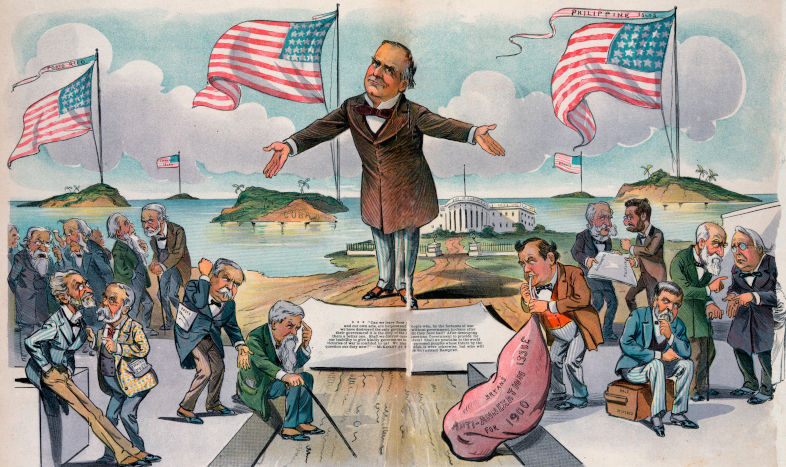Trump Mk II, McKinley and late-imperialism
March 3, 2025
_Donald Trump’s first term as president tested the US’s political boundaries, but his second term has demolished them. A month in and his second presidency is already notable for upending US domestic democracy and completely recasting US foreign policy. Some of this was predictable.
_
Trump had flagged reducing the federal bureaucracy, had indicated a willingness to use tariffs and said he would end the war in Ukraine, if only hinting at his methods. A clue was buried in the second half of his inauguration speech, in which Trump referenced former President William McKinley.
Since Trump was last president, it appears that he has paid some attention to McKinley, who served as president from 1897 until 1901. Under McKinley, the US recovered from economic depression and saw rapid economic growth. McKinley was a protectionist and supported increasing tariffs on imports, which rose to just under 50 per cent after he was first elected.
McKinley also initiated the Spanish-America War, from which the US gained sovereignty over Puerto Rico, Guam and the Philippines, as well as a high level of intervention in Cuba. Under McKinley, the US also annexed Hawaii and was active in enforcing the ‘open door’ trading policy in China.
Trump is unlikely to start a shooting war, given the demonstrated costs and consequences, but the US does have a history of territorial purchases. These include most of the mid-west under the Louisiana purchase, Florida, the US south-west, Oregon and Alaska, as well as many smaller acquisitions.
In this respect, Trump’s proposed purchase of Greenland from Denmark is reprising an earlier imperial claim to ‘manifest destiny’, while turning Gaza into a US controlled ‘Riviera’ is a manifestation of attempted late-imperial reach. His comments about Canada becoming the 51st state can be understood as a part of trying to bend the US’ northern neighbor to US’ economic will.
Under McKinley, the US pursued interest in the Panama region of what was then northern Colombia. Securing Panama’s independence, the rights to construct the Panama Canal and control the Panama Canal Zone fell to McKinley’s vice-president and successor, Theodore Roosevelt.
Having been an isolationist in his first term, Trump now appears more closely aligned with McKinley’s late-imperialism, in which he was depicted in ‘Puck’ magazine as Napoleon. Trump merely references Napoleon’s attributed quote ‘He who saves the country does not violate any law’. McKinley and Trump Mk II were also alike in making the US more assertive on the world stage, although McKinley would likely have deplored Trump’s pandering to Russian President Putin and the US’ loss of influence in Europe.
McKinley enjoyed the support of the country’s then newspaper Hearst and Pulitzer empires, particularly in relation to the Spanish-American War. Trump, on the other hand, has relied on isolating more critical legacy news media while flooding the media landscape with executive orders and disinformation. For the influencer-in-chief, all exposure is good exposure.
From McKinley to Trump, tariffs and intervention in Panama have come full circle. The world has, however, changed greatly since the 1890s. Trump appears to want to use tariffs for two purposes, to protect US industries and to achieve foreign policy outcomes.
Trump has had minor success with forcing Colombia to take undocumented migrants and Canada to increase patrols of its US border. But the world is now vastly more connected and interdependent, and, like most countries, the US relies on imports to complete its own manufactured goods. Tariffs mean imported goods or goods which rely on imported components, such as smart phones, will increase in price, re-igniting inflation. The electoral touchstone of the price of eggs, it should be added, has increased under Trump rather than decreased.
McKinley was a genuine conservative who would likely have baulked at Trump’s domestic trampling of convention. And, although he sometimes operated by sleight of hand – for example planning the Spanish-American War – McKinley respected domestic rule of law.
McKinley was a forceful president but had a largely compliant Congress to do his bidding. Trump, on the other hand, appears to regard the separation of powers between the executive, the legislature and the judiciary as a mere inconvenience. In this, Trump’s use of executive orders functions as decree, a favourite tool of autocrats.
One other matter separates William McKinley from Donald Trump, at least so far. Six months into his second term, McKinley was assassinated by an anarchist who regarded him as a symbol of oppression. Trump is, at this point, only a month into his second term.


